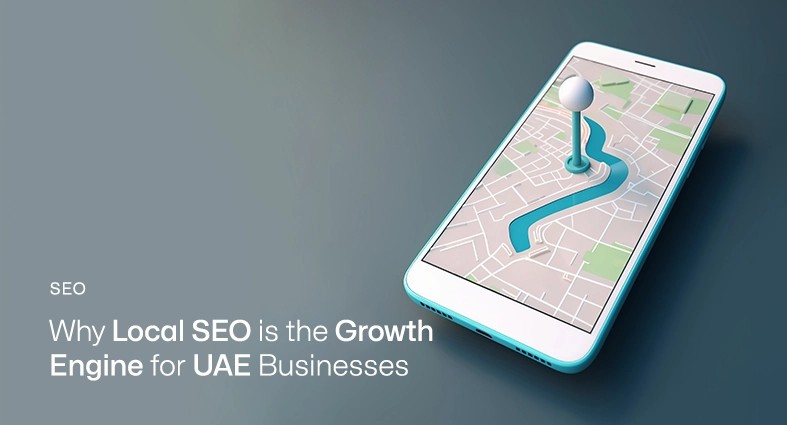Website speed is not just a technical metric; it’s the ignition that propels businesses in Abu Dhabi’s digital race. In this dynamic landscape, where the virtual marketplace never sleeps, the speed at which a website load plays an unprecedented role in shaping both user experiences and search engine rankings. Welcome to the pulse-pounding world of web design services in Abu Dhabi, where milliseconds matter and sluggish load times can translate into missed opportunities. The fusion of web design, speed, and SEO (Search Engine Optimization) is a high-stakes race towards digital supremacy. As we navigate this winding course, we’ll uncover why website optimization for speed isn’t merely a nicety but a necessity for businesses aiming to rev up their online presence in the capital city of the United Arab Emirates. Buckle up; it’s a fast and furious journey through the streets of Abu Dhabi’s digital landscape.
The Need for Speed in Abu Dhabi’s Web Design Services
Abu Dhabi is a bustling city where businesses, both large and small, rely heavily on their online presence to connect with the diverse and tech-savvy population. Web design services in this vibrant emirate are instrumental in helping these businesses establish themselves in the digital arena. These services encompass a wide array of activities, from crafting visually appealing layouts to developing user-friendly functionalities. However, at the core of every successful web design service in Abu Dhabi lies the unyielding commitment to speed.
User Experience and Website Speed
User experience (UX) is a cornerstone of web design services. It’s not solely about aesthetics; it’s about how users perceive and interact with a website. In Abu Dhabi, where businesses are constantly vying for the attention of a diverse and discerning audience, providing an exceptional user experience is non-negotiable. Website speed forms the backbone of web design services as it directly influences how users interact with websites. Whether it’s an e-commerce platform, a corporate site, or a simple blog, the speed at which these websites load profoundly impacts their effectiveness. Slow-loading websites can result in frustrated visitors who are more likely to abandon the site, leading to missed opportunities and potential revenue loss. Therefore, for web design services in Abu Dhabi, optimizing website speed isn’t just a choice; it’s a strategic imperative to deliver the best possible user experience. Moreover, user experience isn’t just about keeping visitors on your site; it’s also about influencing their behavior. A slow website can deter users from exploring your content, making purchases, or taking desired actions, such as signing up for newsletters or submitting inquiries. Conversely, a fast and responsive website encourages users to stay longer, interact more, and ultimately convert into customers or loyal followers.
Why Speed Matters in Search Engine Rankings
Search engines like Google are on a relentless quest to deliver the best possible user experience. As the digital world evolves, so do the criteria they use to rank websites. In this ever-evolving landscape, website speed has emerged as one of the most influential factors. Why? Simply put, a fast-loading website provides a superior user experience. When a user clicks on a search result and the page loads swiftly, they are more likely to stay, explore, and engage with the content. This sends a strong signal to search engines that your website is valuable and user-friendly. In return, search engines reward you with higher rankings. Conversely, a slow website frustrates users, leading to higher bounce rates and diminished SEO performance. To secure a coveted spot on the first page of search results in Abu Dhabi, optimizing your website for speed is no longer optional; it’s a strategic imperative.
The Mobile-First Imperative
Abu Dhabi, like much of the world, has witnessed a mobile revolution. People now access the internet more frequently through their smartphones and tablets than traditional desktop computers. In response to this shift in user behavior, search engines have adopted a mobile-first indexing approach. This means that Google and other search engines predominantly use the mobile version of a website for ranking and indexing. Consequently, a website’s mobile performance is directly tied to its SEO ranking. If your website is slow to load on mobile devices, it not only hampers user experience but also adversely impacts your SEO. In Abu Dhabi’s digital arena, where mobile connectivity reigns supreme, optimizing your website for mobile speed is no longer a choice; it’s an absolute necessity for staying in the SEO game and maintaining a competitive edge.
Common Factors Slowing Down Abu Dhabi Websites
In the relentless pursuit of an exceptional online presence, Abu Dhabi businesses often encounter a formidable adversary: sluggish website speed. The swiftness with which a website loads can significantly impact user experience and SEO rankings. Therefore, understanding the common culprits responsible for decelerating websites in this vibrant UAE capital is essential. Let’s delve into these issues:
- Heavy Images and Videos: One of the most common reasons for sluggish website speed in Abu Dhabi and globally is the use of high-resolution images and videos that are not properly optimized. While stunning visuals are undoubtedly essential, failing to compress images and videos can lead to longer loading times. This, in turn, can frustrate users and negatively impact your SEO.
- Excessive Plugins and Widgets: Plugins and widgets can enhance the functionality and aesthetics of your website. However, an overabundance of these elements can significantly slow down your site. It’s essential to carefully evaluate the necessity of each plugin or widget and eliminate any that do not contribute significantly to the user experience.
- Unoptimized Code: Behind the scenes of every website is a complex web of code. Inefficient or unoptimized code can be a significant drag on website speed. Regular code audits and optimizations are necessary to keep your website running smoothly and at optimal speed.
Tips and Strategies for Speeding Up Abu Dhabi Businesses
In the fiercely competitive digital arena of Abu Dhabi, where every second counts, the speed at which your website loads can be the defining factor between user engagement and frustration. Speed, as we’ve seen, is not just a matter of user convenience; it’s a critical component of SEO success. By optimizing images and videos, minimizing HTTP requests, leveraging browser caching, prioritizing mobile optimization, and utilizing Content Delivery Networks, you can propel your website to the forefront of user engagement and search engine rankings in Abu Dhabi. The following tips and strategies are invaluable tools for Abu Dhabi businesses looking to rev up their website speed, enhance user experience, and boost SEO rankings.
Optimize Images and Videos
High-quality images and engaging videos are crucial for captivating your audience, but they can also be major culprits in slowing down your website. To strike a balance between visual appeal and speed, optimize your images and videos. This involves compressing images without compromising on quality and choosing the right video formats and resolutions. Various online tools and plugins can assist in this process. By reducing the file sizes of your media elements, you can significantly enhance load times, ensuring that your website’s visual assets don’t hinder user experience.
Minimize HTTP Requests
Every element on a web page, whether it’s an image, script, or stylesheet, requires an HTTP request to load. The more requests a page makes, the longer it takes to load, particularly in regions like Abu Dhabi, where internet connectivity may vary. Minimizing HTTP requests is a crucial strategy to boost your website’s speed. You can achieve this by combining files where possible, using CSS sprites to reduce image requests, and leveraging asynchronous loading for non-essential scripts. This optimization approach streamlines the loading process and ensures that your website responds swiftly to user interactions.
Leverage Browser Caching
Browser caching is a powerful technique that can significantly improve website speed by reducing redundant downloads of static resources. When a user visits your website, certain elements like images, stylesheets, and scripts are stored in their browser’s cache. Leveraging browser caching instructs the user’s browser to store these elements temporarily. This means that on subsequent visits, the browser can retrieve these resources from the cache rather than downloading them again from the server. By implementing effective browser caching policies, you reduce server load and enhance your website’s responsiveness, especially for returning visitors in Abu Dhabi who benefit from reduced loading times.
Prioritize Mobile Optimization
Abu Dhabi, like the rest of the world, sees a significant portion of web traffic originating from mobile devices. To ensure that your website offers a seamless experience on smartphones and tablets, embrace responsive web design. This approach ensures that your site adapts gracefully to various screen sizes and resolutions. Additionally, consider optimizing images and other media specifically for mobile devices, as smaller screens demand efficient resource usage. Prioritizing mobile optimization not only enhances user experience but also aligns your website with Google’s mobile-first indexing, a critical aspect of SEO success.
Content Delivery Networks (CDNs)
CDNs consist of a network of servers strategically distributed worldwide. They store cached copies of your website’s content and deliver it to users from the nearest server location. By using a CDN, you can dramatically reduce latency and loading times, regardless of where your visitors are located. This is particularly beneficial for businesses in Abu Dhabi, which often have a global clientele. CDNs ensure that your website content reaches users swiftly, providing an optimal user experience and positively impacting SEO by demonstrating your commitment to speed and accessibility.
Tools for Measuring and Improving Website Speed
When it comes to enhancing your website’s speed, knowledge is power. The ability to measure your website’s current performance and identify areas for improvement is crucial in the quest for faster loading times. Fortunately, there are several highly effective tools at your disposal to help you in this mission. Below, we’ll explore three of the most valuable tools for measuring and improving website speed: Google PageSpeed Insights, GTmetrix, and Pingdom. Each of these tools offer unique strengths for measuring and improving website speed. Depending on your specific needs and preferences, you can choose the tool that aligns best with your goals for achieving fast and efficient websites that cater to the demanding digital landscape of Abu Dhabi.
Google PageSpeed Insights
Google PageSpeed Insights is a versatile and widely used tool that provides comprehensive insights into your website’s speed and performance. Developed by Google itself, this tool offers a two-pronged approach to speed assessment, evaluating your website’s performance on both mobile and desktop platforms. Google PageSpeed Insights provides a detailed report that assigns a performance score based on various metrics. This score is divided into several categories, including:
- Optimization Suggestions: Google PageSpeed Insights not only identifies performance issues but also offers specific recommendations for improvement. These recommendations cover a range of factors, from optimizing images and leveraging browser caching to minimizing render-blocking resources.
- Lab Data: This section provides real-world performance data for your website, including metrics like First Contentful Paint (FCP) and Largest Contentful Paint (LCP). These metrics give you a clear picture of how quickly your website loads for actual users.
- Field Data: Field data offers insights into how your website performs in the wild, based on data collected from real users. It includes Core Web Vitals metrics like First Input Delay (FID) and Cumulative Layout Shift (CLS), which are vital for understanding the user experience.
GTmetrix
GTmetrix is another indispensable tool for assessing and improving website speed. What sets GTmetrix apart is its ability to provide a more detailed and holistic analysis of your website’s performance. This tool combines data from both PageSpeed Insights and YSlow (a tool developed by Yahoo) to offer a comprehensive evaluation. Key features of GTmetrix include:
- Performance Scores: GTmetrix assigns grades based on performance, structure, and various other factors. These grades give you a quick overview of your website’s overall health.
- Waterfall Chart: The waterfall chart provides a visual representation of how each element on your website loads. This helps you identify bottlenecks and slow-loading resources that need optimization.
- Historical Data: GTmetrix stores historical performance data, allowing you to track improvements or regressions over time. This feature is particularly useful for monitoring the impact of speed optimization efforts.
- Recommendations: Like PageSpeed Insights, GTmetrix offers actionable recommendations to improve your website’s speed. These suggestions are tailored to your specific site and are organized by priority.
Pingdom
Pingdom is a user-friendly tool that focuses on real-world website monitoring and performance testing. It’s particularly valuable for businesses seeking to understand how their websites perform in different geographical regions, including Abu Dhabi. Key features of Pingdom include:
- Real User Monitoring (RUM): Pingdom offers RUM capabilities, which means it collects data from actual users visiting your website. This data includes load times from various locations, providing insights into regional speed differences.
- Transaction Monitoring: For e-commerce websites and other online businesses, Pingdom can monitor specific transactions, such as the checkout process. This helps identify performance bottlenecks that may affect crucial user interactions.
- Alerting: Pingdom can alert you if your website experiences downtime or slow loading times. This proactive monitoring helps ensure that your website remains accessible and responsive to users in Abu Dhabi and beyond.
- Performance Grade: Similar to other tools, Pingdom provides a performance grade and suggestions for improvement. It also offers a breakdown of load times for different aspects of your website.
Conclusion
Website speed is a powerful tool that can set your business apart. It’s not just about delivering an excellent user experience but also about securing a prominent position on search engine results pages. By recognizing the symbiotic relationship between website speed, user experience, and SEO, businesses in Abu Dhabi can strategically position themselves for success. Speeding up your website is no longer an option; it’s imperative for thriving in the ever-evolving digital landscape of the UAE capital. Embrace the need for speed, optimize your website, and watch your online presence accelerate to new heights in Abu Dhabi’s dynamic marketplace. Rev up your online presence today with our top-tier Web Design services in Abu Dhabi, and drive your business towards digital success. Contact us now for a faster, sleeker, and more engaging website that drives results!
services
Feel free to send us a message.
Please, share your thoughts, and let's chat over a cup of tea.




















